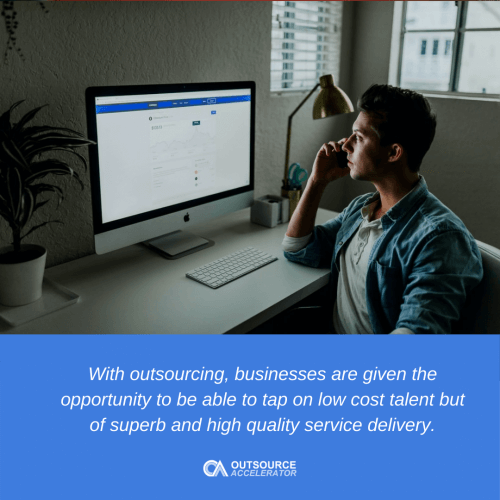Outsourcing Summit 2020 Recap: Outsourcing Deconstructed – Know what you need to know

The final part of the Outsourcing Summit 2020 is the CEO Roundtable, where host and Outsource Accelerator Founder and CEO Derek Gallimore discusses the industry with the CEOs of top BPO companies in the Philippines for small and medium-sized enterprises: Cloudstaff Modern Workforce, Telework PH, and EMAPTA Versatile Services.
>> Outsourcing Summit REPLAY: Watch a full video replay of OS2020 here
Here are some of the topics that the CEOs discussed:
Outsourcing Summit 2020: Value and opportunity on offshore staffing
Telework PH CEO Marge Aviso stated that the COVID-19 pandemic “has literally accelerated the need for businesses to outsource, not specifically to the Philippines, but [generally] all over the world. With outsourcing, businesses are given the opportunity to be able to tap on low cost talent but of superb and high quality service delivery.
While in the past, outsourcing was “limited” to call centers and customer support services, today outsourcing “is taking over,” as you can outsource anything in the Philippines 2 ranging from IT and engineering to human resources.
To add, EMAPTA CEO Tim Vorbach said that the Philippines has been “the backbone for many of the US’s largest corporations for 40 years.” He noted that it’s a huge industry that’s been going on for many decades. For those in doubt, Tim said that the question really is “Why wouldn’t you outsource?” and “Why wouldn’t you at least consider it?” He noted that there’s no technology reason, there’s no personal reason why BPO companies can’t deliver what is required.
Cloudstaff CEO Lloyd Ernst noted that “one common enabling element” that makes outsourcing work “has been the cloud.” Everything can be done through the cloud, so that’s meant it’s been very easy for customers to be able to make sure that they maintain all their systems, all their security, because everything’s just delivered through the web browser or the terminal server.
Outsourcing models, pricings, and transparent salaries
Pricings will always be flexible, as they depend on the quality of the talent. In EMAPTA, according to Tim, they’ve got the teams on the ground that can do all the screening, all the checking. He added that for transparency, their pricing and the talent are selected hand in hand with the client. They will discuss with the client what their budget requirements are, what their needs are, and then the company puts forward a whole range of different talents.
Tim added that there’s no markup in salaries, and clients have complete visibility of all the costs. They charge $499 a month for all of the company’s services – fully comprehensive, and there’s no conflict with the staff.
Lloyd added that because of these transparent models, if clients want to reward the employees, they’re the ones who set the salary increase. The Cloudstaff CEO remarked that “it’s having full control, it’s like having staff inside your own office and that’s the best way to think about it.”
The ethicality of outsourcing: Is it fair?
There’s some concerns in the West that employees in BPO companies are not getting paid enough, with images of sweatshops full of overworked employees coming to mind. While this has been cleared as we toured the company’s top-notch physical offices with state-of-the-art facilities, Derek still asked the CEOs regarding this huge misconception.
Marge started as a BPO agent before being the founder of Telework PH, so she’s had first-hand experience on what it’s like to work as a BPO employee. Marge said that yes, the Philippines offers a lot more cost-savings in terms of employment or offshore hiring, but it doesn’t come at the expense of the employees’ salaries. She added that “the wage [in the Philippines] is definitely fair for what we are offering to our community.”
Further, Tim added that regularly, some of their staff members will “go to Australia or the States and they’ll spend time in the clients’ operations, and they’ll come back to us.” He stated that these employees will say that they don’t want to live overseas, because they look at the comparative value of things. Tim furthered Marge’s point by saying that their organizations are sourcing and employing the top three to five per cent that they consider to be premium talents, and they provide the best facilities and great career opportunities.
Lloyd thinks that they’re “creating the middle-class here,” adding that the employees that work for their customers are that aspirational generation. The middle-class people. He emphasized that they have a completely different model, and that they give opportunities that big corporations don’t. According to Lloyd, their employees have two families, their Cloudstaff family, and their customer family.
Outsourcing Summit 2020: Q&A
The outsourcing summit ended with the CEOs answering questions asked by the virtual audience. To watch the replay of the summit, watch here.
See you next year!










 Independent
Independent




